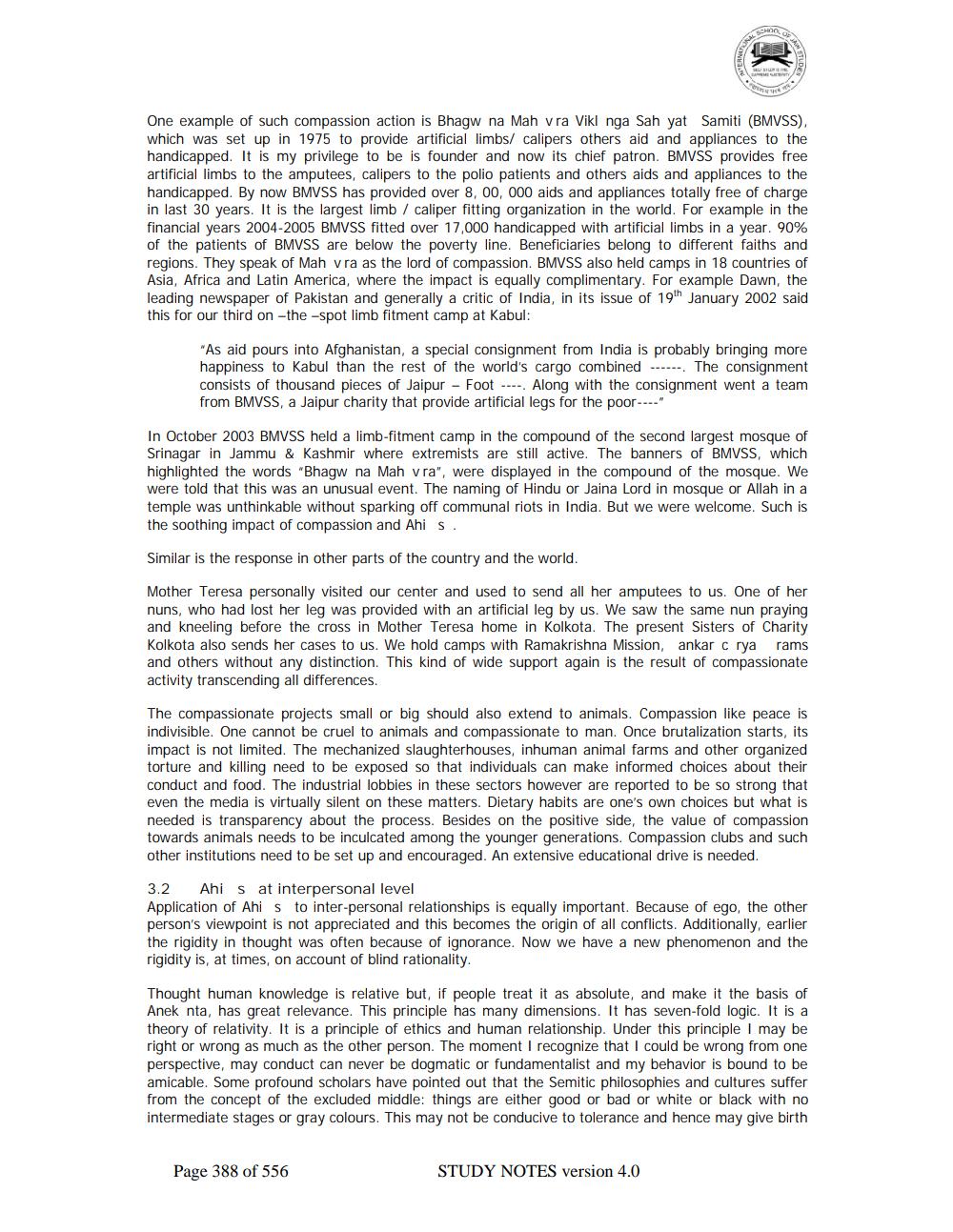________________
One example of such compassion action is Bhagw na Mah vra Vikl nga Sah yat Samiti (BMVSS), which was set up in 1975 to provide artificial limbs/ calipers others aid and appliances to the handicapped. It is my privilege to be is founder and now its chief patron. BMVSS provides free artificial limbs to the amputees, calipers to the polio patients and others aids and appliances to the handicapped. By now BMVSS has provided over 8, 00, 000 aids and appliances totally free of charge in last 30 years. It is the largest limb / caliper fitting organization in the world. For example in the financial years 2004-2005 BMVSS fitted over 17,000 handicapped with artificial limbs in a year. 90% of the patients of BMVSS are below the poverty line. Beneficiaries belong to different faiths and regions. They speak of Mah vra as the lord of compassion. BMVSS also held camps in 18 countries of Asia, Africa and Latin America, where the impact is equally complimentary. For example Dawn, the leading newspaper of Pakistan and generally a critic of India, in its issue of 19th January 2002 said this for our third on-the-spot limb fitment camp at Kabul:
"As aid pours into Afghanistan, a special consignment from India is probably bringing more happiness to Kabul than the rest of the world's cargo combined. The consignment consists of thousand pieces of Jaipur Foot. Along with the consignment went a team from BMVSS, a Jaipur charity that provide artificial legs for the poor----"
In October 2003 BMVSS held a limb-fitment camp in the compound of the second largest mosque of Srinagar in Jammu & Kashmir where extremists are still active. The banners of BMVSS, which highlighted the words "Bhagw na Mah vra", were displayed in the compound of the mosque. We were told that this was an unusual event. The naming of Hindu or Jaina Lord in mosque or Allah in a temple was unthinkable without sparking off communal riots in India. But we were welcome. Such is the soothing impact of compassion and Ahi s
Similar is the response in other parts of the country and the world.
Mother Teresa personally visited our center and used to send all her amputees to us. One of her nuns, who had lost her leg was provided with an artificial leg by us. We saw the same nun praying and kneeling before the cross in Mother Teresa home in Kolkota. The present Sisters of Charity Kolkota also sends her cases to us. We hold camps with Ramakrishna Mission, ankar c rya rams and others without any distinction. This kind of wide support again is the result of compassionate activity transcending all differences.
The compassionate projects small or big should also extend to animals. Compassion like peace is indivisible. One cannot be cruel to animals and compassionate to man. Once brutalization starts, its impact is not limited. The mechanized slaughterhouses, inhuman animal farms and other organized torture and killing need to be exposed so that individuals can make informed choices about their conduct and food. The industrial lobbies in these sectors however are reported to be so strong that even the media is virtually silent on these matters. Dietary habits are one's own choices but what is needed is transparency about the process. Besides on the positive side, the value of compassion towards animals needs to be inculcated among the younger generations. Compassion clubs and such other institutions need to be set up and encouraged. An extensive educational drive is needed.
3.2 Ahi s at interpersonal level
Application of Ahi s to inter-personal relationships is equally important. Because of ego, the other person's viewpoint is not appreciated and this becomes the origin of all conflicts. Additionally, earlier the rigidity in thought was often because of ignorance. Now we have a new phenomenon and the rigidity is, at times, on account of blind rationality.
Thought human knowledge is relative but, if people treat it as absolute, and make it the basis of Anek nta, has great relevance. This principle has many dimensions. It has seven-fold logic. It is a theory of relativity. It is a principle of ethics and human relationship. Under this principle I may be right or wrong as much as the other person. The moment I recognize that I could be wrong from one perspective, may conduct can never be dogmatic or fundamentalist and my behavior is bound to be amicable. Some profound scholars have pointed out that the Semitic philosophies and cultures suffer from the concept of the excluded middle: things are either good or bad or white or black with no intermediate stages or gray colours. This may not be conducive to tolerance and hence may give birth
Page 388 of 556
STUDY NOTES version 4.0




